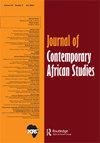Thirty years of Male Daughters, Female Husbands: revisiting Ifi Amadiume’s questions on gender, sex and political economy
IF 0.8
Q2 AREA STUDIES
引用次数: 4
Abstract
ABSTRACT This paper examines the legacy of Ifi Amadiume's Male Daughters, Female Husbands: Gender and Sex in an African Society (1987) to African gender theorisation three decades after its publication. We argue that Amadiume's detailed ethnography of the Nnobi society provides an example of what can be achieved when African scholars centre local histories, languages, and kinship ties to provide contextualised understandings of sex and gender. In southern African societies, we assess the ways in which gender fluidity, drawing from local languages, age, seniority and lineage do not strictly fix sex to gender, thus providing possibilities for flexible gender structures that allow women to access institutions of power through the lineage as first daughters (umafungwashe) and wives, among others. We further examine the ways conservative patriarchal discourses continue distorting African cultures and traditions, thus undermining women's rights and access to social, cultural, economic and political power. We argue that current Eurocentric attempts that aim to delink sex and gender do not move us beyond the universalised binaries of gender and sex. Through revisiting local social and linguistic histories that practised gender fluidity and tolerance, we can also begin to challenge the conservative attitudes towards the LGBTQIA+ communities. Given the continued sexual and gender diversities that are being challenged daily in the African continent, it is timely that we revisit the historical meanings along with their contemporary implications for sexual citizenship and gendered power relations today.三十年的男女儿,女丈夫:重新审视伊菲·阿玛迪姆关于性别、性和政治经济的问题
摘要本文考察了Ifi Amadiume的《男性女儿,女性丈夫:非洲社会中的性别与性》(1987)在出版30年后对非洲性别理论的影响。我们认为,Amadiume对Nnobi社会的详细人种志提供了一个例子,说明当非洲学者以当地历史、语言和亲属关系为中心,提供对性和性别的语境化理解时,可以取得什么成就。在南部非洲社会,我们评估了从当地语言、年龄、资历和血统中得出的性别流动性如何没有严格地将性别固定为性别,从而为灵活的性别结构提供了可能性,使妇女能够通过血统作为第一女儿(umafungwashe)和妻子等进入权力机构。我们进一步研究了保守的父权话语继续扭曲非洲文化和传统的方式,从而破坏了妇女的权利和获得社会、文化、经济和政治权力的途径。我们认为,当前以欧洲为中心的旨在分离性和性别的尝试,并没有使我们超越性别和性的普遍二元对立。通过回顾当地的社会和语言历史,实践性别流动性和宽容,我们也可以开始挑战对LGBTQIA+社区的保守态度。鉴于非洲大陆持续的性和性别多样性每天都在受到挑战,我们有必要重新审视其历史意义以及它们对今天的性公民身份和性别权力关系的当代影响。
本文章由计算机程序翻译,如有差异,请以英文原文为准。
求助全文
约1分钟内获得全文
求助全文
来源期刊

Journal of Contemporary African Studies
AREA STUDIES-
CiteScore
2.20
自引率
0.00%
发文量
18
期刊介绍:
Journal of Contemporary African Studies (JCAS) is an interdisciplinary journal seeking to promote an African-centred scholarly understanding of societies on the continent and their location within the global political economy. Its scope extends across a wide range of social science and humanities disciplines with topics covered including, but not limited to, culture, development, education, environmental questions, gender, government, labour, land, leadership, political economy politics, social movements, sociology of knowledge and welfare. JCAS welcomes contributions reviewing general trends in the academic literature with a specific focus on debates and developments in Africa as part of a broader aim of contributing towards the development of viable communities of African scholarship. The journal publishes original research articles, book reviews, notes from the field, debates, research reports and occasional review essays. It also publishes special issues and welcomes proposals for new topics. JCAS is published four times a year, in January, April, July and October.
 求助内容:
求助内容: 应助结果提醒方式:
应助结果提醒方式:


